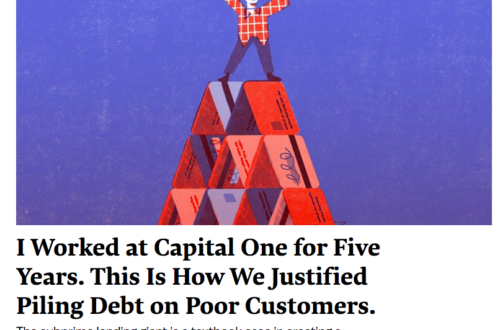On Monday, 181 chief executives of companies like JP Morgan, Apple, and Comcast took out a full-page-ad in the Wall Street Journal to announce that their group, the Business Roundtable, was redefining the “purpose of the corporation.” Their old philosophy said “corporations exist principally to serve their shareholders.” Now, the group says, they’ll do their part to create an “economy that allows each person to succeed” by balancing the interests of shareholders, customers, employees, and the community.
This is good news on paper. Obviously, it’s better to have a bunch of high-minded CEOs than for our corporations to be run by people who don’t even pretend to care about their workers or the world. But here’s the rub: CEOs really aren’t the ones who get to define the “purpose of the corporation.” Shareholders do. CEOs manage the company, but shareholders own it. If any corporate management team acts on the Business Roundtable’s new principles enough to meaningfully cut into profits, they stand to be fired by their “boss:” the market.
To see why, we have to start with an obvious point: polluting the environment, stripping workers of bargaining power, and leaching communities of their tax bases can all be incredibly lucrative. TedTalk speakers like Wendy Woods, Managing Director of BCG, argue that when executives care about their “total social impact,” it ultimately helps the business’ bottom line. But the idea that the most profitable business strategies are also the best for society is pure magical thinking. Exploitation can be the most profitable strategy, even over the medium-to-long term; consider companies that chronically pay poverty-level wages to their employees, like McDonald’s. If you invested $100 in 1980 in the Dow Jones Industrial Average and McDonald’s, your Dow Jones investment would be worth a healthy $9,777, but your McDonald’s stock would be worth a staggering $1,275,498.
It may not bankrupt Exxon Mobil to get serious about climate change, and it may not bankrupt Walmart or Target to pay a living wage to all their employees. I would assume you could run a genuinely ethical business in many industries and still turn a tidy profit. That’s not the point, though; the investors with the most money aren’t looking to just make their “fair share” of profits, they want to make as much money as they can. If a company like Walmart has a 3% “return on equity” if they pay a living wage, and a 15% “return on equity” while their employees need to trade off between food and medicine, you can bet that implementing the first strategy would quickly result in the CEO being ousted by the shareholder-elected board. Earlier this year, when Walmart shareholders were asked to vote on a proposal for the company’s hourly employees to be included on the board, less than .01% voted “yes.”
Even for large and well-capitalized companies, activist investors and the threat of a hostile takeover can be a real thorn in management’s side. In 2016, The Atlantic reported that DuPont was forced to merge with Dow Chemical Company after a campaign by activist investor Nelson Peltz; when the merger went through, DuPont laid off 10% of it’s workforce, nearly 5,000 people. Companies that seek to codify their commitment to social responsibility by seeking “B-Corp” status aren’t immune either. In 2017, after big investments by private equity firms, the board of Etsy fired CEO Chad Dickerson and dropped their B-corp status. Soon after, the new CEO, Josh Silverman, laid off 200 employees and dismantled the team that oversaw the company’s social and environmental initiatives. If you’re a publicly-traded company, you can’t control who buys your stock. As long as there are investors that can buy out companies they think are underperforming relative to their potential, “corporate social responsibility” will always be pure window dressing.
Every CEO who signed the Business Roundtable statement understands these dynamics perfectly. It’s hard to say whether the Business Roundtable statement is a cynical PR play, an attempt to band together to influence the investor community, or a naive and self-serving belief that only small changes are needed to be on the right side of history.
For the entrepreneurs who truly want to pursue a “triple-bottom-line” business model, we need to rethink how “B-Corps” work. It doesn’t make any sense that hedge fund vultures can force a B-Corp to abandon their values. More importantly, Americans need to fight harder than ever for rules that will force plutocrats to clean up their messes: reversing the Trump and Bush tax cuts on corporations and the 1%, banning “forced arbitration” agreements so workers and consumers can have their day in court when they’re wronged by corporations, and making businesses that emit greenhouse gases pay the environmental costs. What’s clear is this: we can’t rely on CEO benevolence to fix what’s broken about our economy, to empower working-class Americans, or to turn the tide on climate change.
Have you subscribed to my newsletter, A New Money Order? It’s my round-up of my favorite writing about the economy, and the best way to stay in touch of what I’m working on.






One Comment
AlbertoDQ
https://lustra40.ru/svetilniki/svetodiodnye-led/